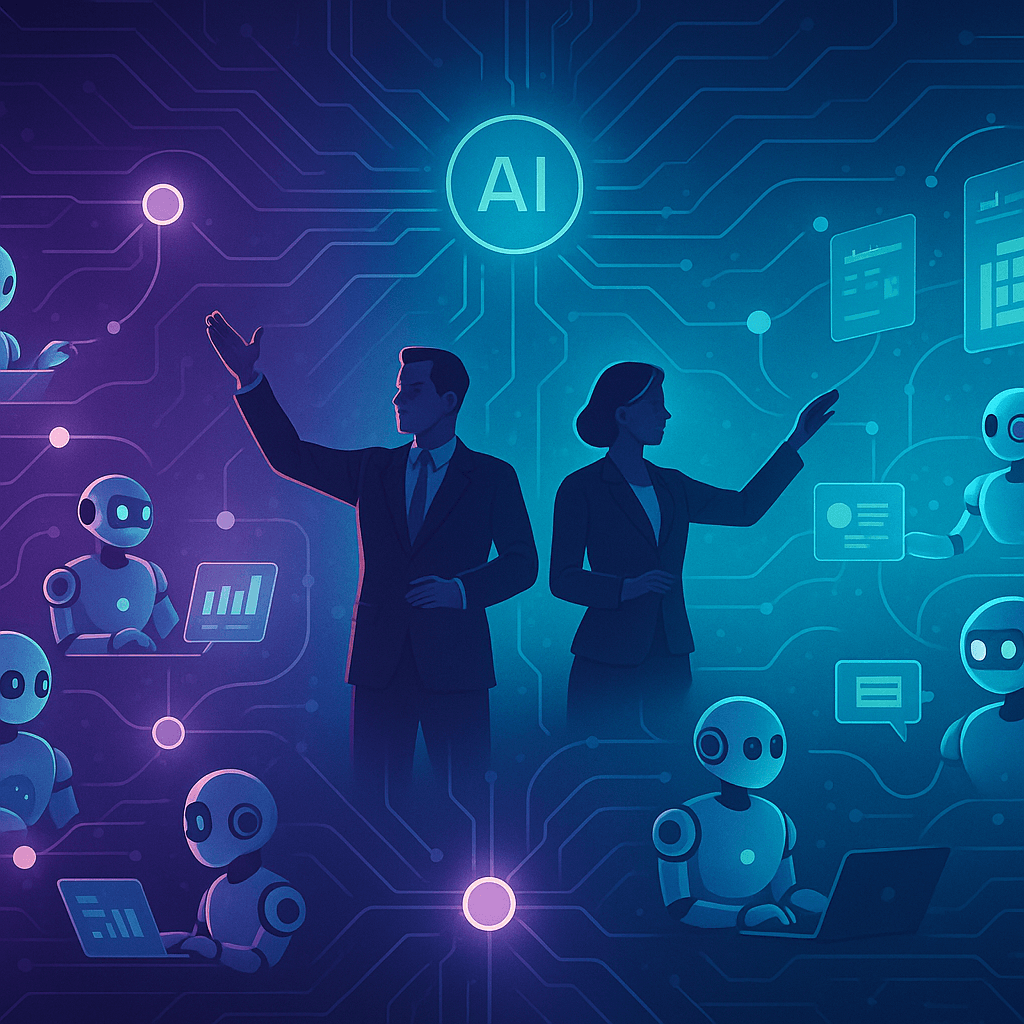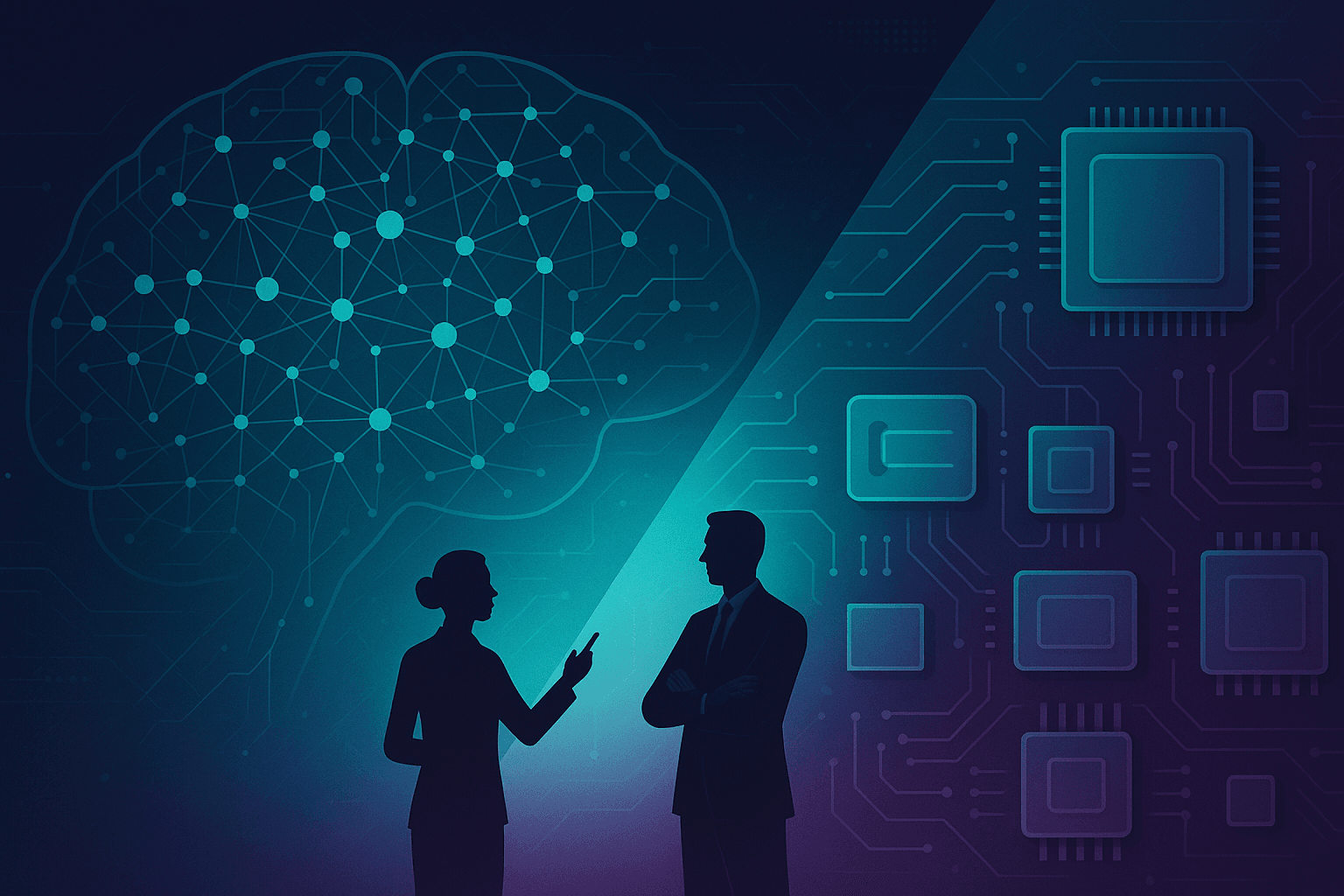Where CMOs are placing their AI bets
Perspectives from marketing leaders at Cannes Lions 2025.

The era of AI experimentation is over. Marketing leaders at Cannes 2025 made it clear: the professionals who master human-AI collaboration will define the next decade of marketing — while those who don’t risk being left behind.
The conversations happening in Cannes beachside cafés this year weren’t about creative awards or campaign budgets. They were about survival. Marketing leaders at Cannes Lions 2025 came with one burning question: How do we scale AI beyond pilot programs without losing our teams — or our competitive edge?
TL;DR
- Fortune 500 leaders at Cannes were focused on scaling proven use cases and agents rather than exploring what’s possible — Career implication: The time for AI curiosity has passed; execution skills are now the differentiator.
- The real hurdle isn’t technology but helping teams see AI as creative amplification, with companies creating new AI roles rather than cutting jobs — Career opportunity: Massive demand for professionals who can bridge human creativity with AI capability.
- CMOs are evolving from departmental execution to driving AI strategy across legal, finance, and product teams organisation-wide — Career expansion: Marketing professionals with systems thinking can lead enterprise transformation.
- Enterprises and agencies are choosing end-to-end AI platforms over cobbled-together point solutions — Skill requirement: Platform orchestration and vendor evaluation becoming critical competencies.
- Companies winning with AI start with high-impact use cases, prove clear ROI, then scale systematically — Career positioning: Professionals who can demonstrate AI ROI will become indispensable.
- Speed is the new competitive advantage — not cost savings or content volume, but speed to market and real-time optimisation — Career differentiator: Marketing professionals who can orchestrate AI for rapid execution will define the next generation of leadership.
What really captured attention was how people talked about AI — not as some distant future possibility, but as current reality they were already navigating, sometimes successfully, sometimes not. At Cannes Lions 2025, marketing leaders and CMOs signalled a marked shift from AI experimentation to scaling proven, business-impactful use cases, focusing on integrating AI deeply into marketing strategy and operations.
The focus honed in on how agentic AI is creating a new generation of builders, with consensus that the future of AI won’t just rely on tech experts but be shaped by creatives, problem-solvers, and operational experts from every corner of the enterprise. Crucially, marketing is leading the way for adoption, with agents already driving hyper-personalised campaigns, scaled customer experiences, and intelligent media buying.
At Ascend, we analyse these industry inflection points not just to understand what’s happening, but to decode what it means for marketing careers in the intelligent age. The insights from Cannes 2025 reveal a profession in rapid transformation — one that’s creating entirely new pathways for those who can navigate the change, while leaving others behind.
The Career-Defining Shift: From AI curiosity to implementation reality
What’s clear: AI has Moved to Center Stage — And Marketing Is Leading
Conversations happening in boardrooms and beachside cafés alike all focused on one thing: AI. But leaders had moved beyond the usual polite networking chats to asking the hard questions — implementation challenges, ROI timelines, and crucially, “what this means for my workforce.”
While AI was everywhere at Cannes, what stood out was how companies are moving beyond pilot purgatory into real execution. Agentic AI is scaling fast, redefining workflows and proving real value across both B2B and B2C organisations. CMOs from Fortune 500 brands were primarily focused on scaling proven AI use cases and deploying AI agents, rather than exploring unproven possibilities.
The tone of the event shifted notably: “The casual ‘what can this do?’ questions had given way to urgent ‘how do we scale our (and others’) successful use cases and agents?’ conversations.” This marks a decisive move beyond pilot purgatory, with agentic AI impacting workflows and customer experiences across industries.
Why This Matters for Marketing Professionals
Here’s the career-defining insight: Marketing is leading the way for AI adoption. Agents are already driving hyper-personalised campaigns, scaled customer experiences, and intelligent media buying. This isn’t future planning — it’s current reality that marketing professionals are navigating right now.
But to realise full impact, organisations need three critical foundations: strong first-party data capabilities, AI-literate teams, and clear KPIs to validate use cases. Each of these represents massive career opportunities for marketing professionals who can develop these competencies.
The Career Implication: A Profession Bifurcating
This creates a stark dividing line in marketing careers. The conversation had matured from “How do we get started?” to “How do we scale these successful agents across the organisation?” Marketing professionals who understand AI implementation — not just AI possibilities — are becoming indispensable. Those still in exploration mode risk being left behind as organisations move to execution at speed.
The biggest challenge leaders identified? Distinguishing real capabilities from polished marketing promises. When every AI company claims they can do everything, how do you know who actually delivers? This vendor fatigue was everywhere — from CMOs at global banks to marketing VPs at tech unicorns. For marketing professionals, this creates opportunity: those who can evaluate AI solutions and guide implementation decisions are becoming invaluable.
The Talent Revolution
The Surprising Reality: From Potential to Performance
The conversation has fundamentally shifted. Marketing leaders weren’t asking about AI’s potential anymore — they were laser-focused on scaling what was already working. Several had production use cases running and were eager to expand from there. The conversation had matured from “How do we get started?” to “How do we scale these successful agents across the organisation?”
But here’s where career opportunities emerge: The biggest challenge leaders identified was distinguishing real capabilities from polished marketing promises. When every AI company claims they can do everything, how do you know who actually delivers? This vendor fatigue was everywhere — from CMOs at global banks to marketing VPs at tech unicorns. For marketing professionals, this creates massive opportunity: those who can evaluate AI solutions, cut through vendor noise, and guide implementation decisions are becoming invaluable.
From fear to empowerment: The cultural transformation
Despite widespread fears about AI replacing marketing jobs, Cannes 2025 revealed the opposite reality. CMOs placed significant emphasis on reskilling teams and creating new AI roles, framing these initiatives as essential to realising AI’s full potential in marketing rather than as responses to job displacement fears.
The irony wasn’t lost on anyone: At the creative industry’s biggest, most glamorous stage, AI companies were marketing AI tools to creative people who are simultaneously worried about automation. Yet what we learned from conversations echoed throughout Cannes: none are cutting jobs because of AI. Instead, they have mountains of AI-related roles they can’t find people to fill.
AI as creative amplification: The cultural shift challenge
The real challenge isn’t features or pricing — it’s change management. The transition to an AI-first marketing environment requires more than technical retraining; it demands a cultural shift. CMOs emphasized creating an environment where AI is seen as a co-pilot for creative expression and business growth, not merely as a tool for efficiency gains.
How do you have honest conversations with teams who are simultaneously excited about AI’s potential and genuinely worried about their future? CMOs and brand leaders were trying to navigate this delicate balance in real-time, some more successfully than others. This creates another career opportunity: professionals who can lead change management and cultural transformation around AI adoption.
What actually works: The “Left-Brain” marketing opportunity
The most successful implementations handle the repetitive, soul-crushing tasks so creative people can focus on what they do best — being creative. When AI becomes invisible infrastructure — quietly handling optimisation and endless variations while humans focus on big ideas and strategy — that’s when the magic happens.
CMOs stressed that the modern marketing team must combine creativity, business management, and science/analytics skills. There’s an explicit call for more “left-brain” marketers who can operate effectively alongside AI and interpret its outputs for business value. This represents a significant career positioning opportunity for analytically-minded marketing professionals.
The success metrics evolution
The yardstick for AI success has matured. It’s not just about productivity gains; organizations now evaluate AI projects by concrete business outcomes such as revenue impact, time savings, and customer engagement. This requires not only robust, unified first-party data foundations but also AI-literate teams and new workflows for human-AI collaboration.
Demonstrated ROI doesn’t just come from technology — it’s also an outcome of upskilling teams to use AI strategically, align on business goals, and develop “prompt fluency.” Marketing professionals who can demonstrate these concrete business outcomes — rather than just productivity metrics — will become indispensable to their organisations.
The New Marketing Operating System: Human-AI Collaboration at Scale
How Human-AI partnership distinguishes leaders
Generative AI is accelerating creativity and execution — helping marketers move from concept to campaign in record time, while freeing up capacity for higher-value thinking and more impactful outcomes. But as AI-generated content floods the landscape, real differentiation comes from keeping humans in the loop.
The rise of AI in marketing is leading to an expansion of roles such as “Creative AI Producer” and “Marketing Data Scientist.” Existing roles are being augmented or redefined, with employees moving into hybrid positions that blend creative, analytical, and technical skills.
The emerging role landscape
As roles evolve and new ones emerge, organisations are rethinking the skills, oversight, and collaboration needed in an AI-driven world. Traditional marketing professionals are being reskilled to orchestrate AI tools — creative and production staff transitioning into AI content orchestration roles, while campaign managers evolve into AI workflow architects. The most in-demand roles include:
- Creative AI Producer / Content Automation Lead: Combining deep brand storytelling expertise with hands-on AI deployment skills
- Marketing Data Scientist / AI Personalisation Architect: Building hybrid analysis capabilities for AI-powered customer journeys
- AI Marketing Strategist: Guiding AI integration across marketing’s full spectrum, working at the intersection of tech, creative, and business
- Prompt Engineer / Marketing AI Trainer: Developing AI prompting fluency as a core marketing competency
The skills that matter
CMOs stressed that the modern marketing team must combine creativity, business management, and science/analytics skills. There’s an explicit call for more “left-brain” marketers who can operate effectively alongside AI and interpret its outputs for business value.
As Ruba Borno from AWS noted: “Just as people that understand code now have a skill, the coding of the future is going to be prompts.” This emphasises the critical importance of understanding and optimising how humans engage with AI agents and agent ecosystems.
The strategic imperative: From silos to systems
The platform approach
Enterprises and agency partners are increasingly choosing end-to-end AI platforms, rather than piecing together point solutions or costly custom builds. The consensus: scalable, integrated solutions are required for orchestrating customer intelligence and delivering cross-channel personalised experiences at scale.
When Fortune 500 companies are already spending $100 million annually on various initiatives, they need AI investments that deliver the highest ROI — not another expensive experiment that may or may not work. That’s why enterprises seek AI partners who work alongside both IT and business teams, while agencies and consultants look for platforms that enable them to deliver strategic value rather than just managing multiple vendor relationships.
What actually works: Focus first, scale smart
Companies getting real value aren’t trying to transform everything at once. They pick specific, high-impact use cases, prove clear value, then expand from there. This approach creates opportunities for marketing professionals who can identify these high-impact applications and demonstrate concrete ROI.
The Cross-Functional Evolution: CMOs as Enterprise AI Leaders
Expanding beyond marketing: AI as enterprise infrastructure
The CMO's remit is extending beyond just marketing, with many now leading AI strategy involving legal, finance, product, and technology teams. Evolving from departmental execution to driving AI strategy organisation-wide.
This expansion creates unprecedented career opportunities for marketing professionals who can think beyond campaign execution to enterprise transformation. The key insight? Think about AI as enterprise infrastructure, not just a marketing tool. The marketing leaders becoming organisational heroes introduce AI that helps legal review content faster, enables finance to track attribution more accurately, and allows product teams to test messaging at unprecedented scale.
Cross-industry applications: the scope of opportunity
This transformation is happening across industries. We're seeing healthcare companies helping members truly understand their benefits, pharmaceutical teams preparing for complex sales conversations with detailed research, and retailers optimising product listings in real-time based on customer sentiment analysis. For marketing professionals, these examples illustrate the breadth of AI applications and career opportunities beyond traditional marketing boundaries.
The career evolution example: From marketing execution to enterprise transformation
One VP at a major consumer goods company perfectly exemplified this career evolution. Twenty years climbing the marketing ranks, she's now been tasked with developing the AI strategy by her CEO and Board - essentially figuring out how the entire company transforms into an AI-first organisation. She's not just thinking about marketing use cases; she's examining every process that runs the business for AI integration opportunities.
Her focus centers on the fundamental question every marketing professional must now consider: the interplay between humans and AI. Who does what and how do we work side by side with agents? It's a complete reimagining of her role from marketing execution to enterprise transformation —and it represents the career trajectory available to marketing professionals who can master AI orchestration.
Speed as strategy: The ultimate career differentiator
Perhaps the most critical insight from Cannes was this: The metric that actually matters isn't cost savings or content volume - it's speed to market and the ability to iterate and optimise in real-time. When customer preferences can shift overnight and competitive advantage is measured in days rather than quarters, this agility becomes the ultimate strategic differentiator.
For marketing professionals, this creates a clear positioning strategy: those who can help organizations move faster, test more efficiently, and adapt in real-time will become indispensable. Speed isn't just a business advantage - it's a career advantage. The professionals who can orchestrate AI to deliver this speed will define the next generation of marketing leadership.
The ascend perspective: Navigating career complexity in the intelligent age
Why This Matters for Your Career
The Cannes insights reveal that marketing is experiencing its most significant transformation since the advent of digital advertising. The professionals who understand and adapt to this shift will define the next generation of marketing leadership. But navigating this transformation requires more than just learning new tools - it demands understanding which skills will remain valuable, which new capabilities to develop, and how to position yourself in an AI-augmented marketing landscape.
The signal in the noise
At Ascend, we're building the platform that helps marketing professionals and organisations navigate exactly this complexity. The Cannes insights reinforce why we've designed our platform around three core capabilities
- Market Pulse: Understanding industry shifts like those revealed at Cannes and translating them into actionable career intelligence
- Skills Orchestration: Mapping the emerging competencies - like AI collaboration and prompt engineering - that are becoming essential for marketing success
- Personalised Navigation: Providing customised pathways for developing the hybrid skills that make marketing professionals indispensable in an AI-driven landscape
The career acceleration opportunity
While marketing leaders at Cannes were asking how to scale AI across their organisations, marketing professionals need to ask how to scale their own capabilities to remain valuable in this new environment. The answer isn't just learning AI tools - it's developing the strategic thinking, adaptive capability, and cross-functional perspective that make human expertise irreplaceable even as AI capabilities expand.
Where the Industry Goes from Here: The Post-Cannes Reality
The measurement evolution: What success actually looks like
Marketing leaders will measure AI success by concrete business outcomes - revenue impact, time savings, and market response - rather than productivity metrics alone. For marketing professionals, this represents a crucial career positioning opportunity: those who can demonstrate and communicate these business outcomes, rather than just operational efficiencies, will become indispensable to their organisations.
The systematisation imperative
The ad hoc experimentation phase is ending. Leaders will have established clear workflows for human-AI collaboration, not experiments that depend on individual enthusiasm. This creates another essential skill for marketing professionals: the ability to design, implement, and optimise systematic human-AI workflows rather than relying on one-off successes.
The partnership evolution
Marketing leaders will be having entirely different conversations with their AI partners - selecting vendors who work alongside IT and business teams rather than selling one-size-fits-all solutions. For marketing professionals, vendor evaluation and partnership management becomes another critical competency, especially the ability to identify true collaborative partners versus traditional software sellers.
The implementation pressure
The Cannes energy and Mediterranean sunshine will fade, but the practical pressure won't. Marketing leaders who were pressured to "do something with AI" will need to show real results to their boards. The industry is bifurcating: those who figured out how to start small, prove tangible value, and scale systematically will be expanding their programs and budgets. Those who didn't will be starting over, hopefully with clearer understanding of what actually works.
This creates immediate career implications. Marketing professionals who can help their organisations move from the "starting over" category to the "systematic scaling" category will position themselves as essential strategic assets.
The human connection imperative
Despite AI's rise, a recurring theme was the imperative to preserve brand purpose and human connection. "Being undeniably human is the true differentiator. Breaking through with audiences is not about shouting louder; it's about connecting more deeply" (Steven Bartlett, The Diary of a CEO).
AI is now intrinsic to marketing function, with CMOs transitioning from exploration to systematic scale, driving organizational change, investing in upskilling, and maintaining strong focus on both human connection and brand purpose alongside technological innovation. The best implementations don't draw a line between AI and creative work; instead, they leverage AI to enable richer, more authentic, and more relevant brand storytelling at scale.
The bottom line: Your career strategy in the AI age
The future isn't about choosing between human creativity and AI efficiency - that's a false choice. It's about combining them in ways that make both more powerful than they could ever be alone. The marketers who figure that out first will define the next phase of our industry.
AI is now intrinsic to marketing function, with CMOs transitioning from exploration to systematic scale, driving organisational change, investing in upskilling, and maintaining a strong focus on both human connection and brand purpose alongside technological innovation.
The transformation is accelerating. The opportunities are expanding. The window for proactive career navigation is narrowing. The professionals who master the integration of human creativity with AI capability won't just survive the marketing transformation - they'll define it.
Ready to navigate the complexity and accelerate your next move? This is exactly the challenge Ascend was built to solve.
Sign up for early access 👉 www.ascendplatform.net


